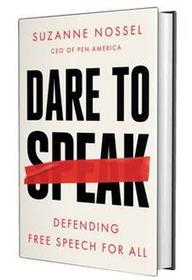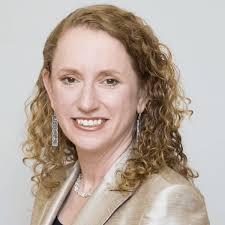
|
 |
Shelf Awareness spoke recently with Suzanne Nossel, CEO of PEN America, whose new book, Dare to Speak: Defending Free Speech for All, was published July 28 by Dey Street Books. In the book, Nossel examines what she calls "a dramatic escalation in conflicts over the permissible bounds of speech" in books, protests, online, in the workplace and the media. Relying on work PEN America has done "to explain how the drive for a more equal, inclusive, and just society can--and must--be reconciled with robust protections for free speech," Dare to Speak offers 20 principles for accomplishing this goal. Here Nossel discusses the debate and how bookstores are affected.
One of the reasons I wanted to write this book is because I have become concerned through our work at PEN America and particularly our work on college campuses that there is a rising antipathy towards the First Amendment and free speech protection in that people see them, in certain instances, as inimical to the drive toward a more equal, inclusive and just society. The scenario in which that comes up the most is concerning hateful speech and the kind of uncorking of and legitimizing of hateful speech that has occurred in our society in recent years. In response, there's been a determination, which I think is very rightful and understandable, by many people to clamp down on and address hate speech. When that's done through counter-speech, condemnations, organizing, that's a very good thing. But it can veer into censoriousness, and sometimes not just for speech that we probably all would agree is manifestly bigoted, but for other speech that's much more debatable.
With booksellers I think it's a slightly different nuance. It's the idea that there are certain books and viewpoints that are inimical to the goal of a more just and equitable society and that by offering those books and making them available, a bookseller is standing in the way of social progress or committing an offense in and of itself simply by the selling those books.
The argument that I make in the book is that we absolutely do need to drive forward to the next level of diversity, equity, inclusivity and justice in our society, but that doing so should not come at the expense of robust protections for free speech because ultimately free speech will help us achieve those goals.
Bookstores are one of a shrinking number of spaces that we have in our society where you really can encounter a wide breadth of viewpoints. That happens less and less on our social media feeds and our cable news stations because they're more and more ideologically defined. I think it's extremely important to have open forums like a bookstore where you can browse around and you may encounter something that you disagree with, but perhaps you'll pick it up and you'll start to read, and you'll learn something, even if that something is how to more effectively rebut and refute the ideas that you reject.
I think it's up to every bookseller to stock as they see fit, and there shouldn't be an effort to impose that judgment collectively. The essential role of the bookseller and the magic of a bookstore is the discernment of a bookseller in choosing what assemblage to put forward.
The idea that someone shouldn't be allowed to special order a book is difficult. You don't know why they want the book. They may be doing important research on a topic where they need to delve deeply into ideologies they reject, so it doesn't necessarily reflect by any means that someone is going down a path towards extremism because they want to partake of a certain line of thinking. If there is a reader who is persistently ordering books about incendiary topics or guides to bomb making, that's a different situation, and that's not what we're talking about here.
It worries me that there would be an effort to impose a kind of orthodoxy from above about what books can and can't be sold. We've seen many instances in the past and to this day of book bannings. It happens particularly in relation to children's books. When you give school boards or parent committees the power, what do they go after? It's overwhelming books with LGBT stories, transgender stories. That power can be used to increase marginalization and enforce the narratives of the powerful. It may be that in a given instance, someone's motivation is the opposite of that. They're trying to expunge what they consider to be hateful. But the minute that booksellers start arbitrating what books are within or outside of bounds, there is that risk that that power will be misused.
There can be this inclination to ask an authority to step in and delineate the boundaries of permissible speech or books that booksellers are allowed to purvey. Ultimately it's a dangerous instinct to afford that power to some higher authority with a great faith that it will be used judiciously. It may not be, and that's why with the First Amendment that we have such tight circumscriptions on the power of government to arbitrate speech because we worry who and how that power will be exercised. The Trump Administration is a great reminder that those worries are not specious.

